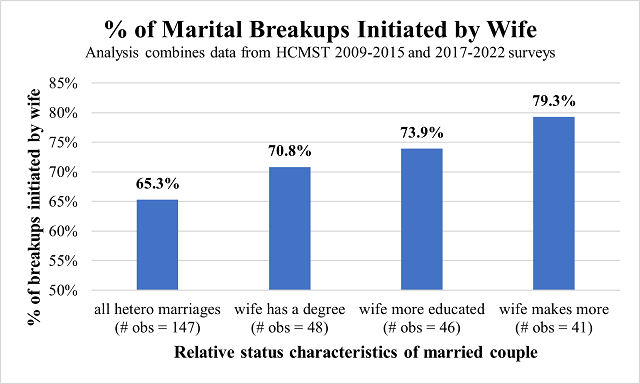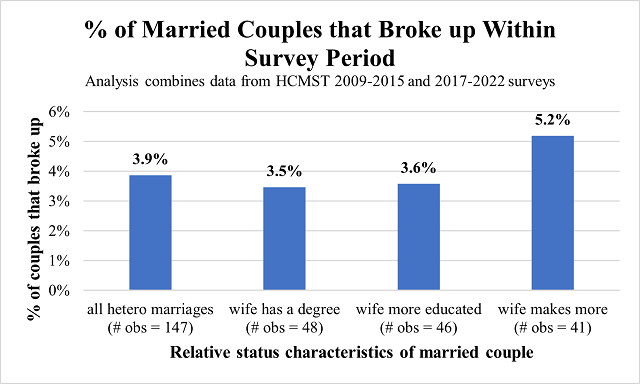Highlights
- In couples where the wife makes more money than the husband, she’s very likely to have been the one to initiate divorce. Post This
- [Even today], both men and women still view the burden of supporting a family financially to be an important requirement for a good husband. Post This
- There are sex differences between men and women that impact relationship dynamics for heterosexual couples, and one of those is a greater relative expectation for the male partner to provide. Post This
In a recent Substack post, Alice Evans discussed status and gender inequality and how they relate to heterosexual relationships. She presented data from several countries in support of a few assertions, one of which was: “If men’s self-esteem and social respectability is contingent on them dominating their wives, they may purposefully keep them economically dependent or else beat them into submission.” For instance, she presents data from Abigail Weitzman, which shows that “Indian women who have more education or higher earnings than their husbands have the highest likelihood of frequent and severe violence.”
However, she also cites divorce data from the US, which show that “when the wife earns more than the husband, these couples are more dissatisfied and more likely to get divorced.” While she doesn’t misrepresent those results, I think their presentation alongside the data on Indian women’s marriages encourages the reader to make an unwarranted comparison. As I asked in a post I wrote on Feminism and Status, “Is it that men are uncomfortable with their wives being high status or that high status women feel they can do better? Without doing the requisite research, I’d guess probably both.”
Well, I’ve now done the requisite research.
In that post, I mentioned that divorces are typically initiated by women, citing Michael Rosenfeld’s research1 that found nearly 70% of breakups of heterosexual marriages were initiated by the wife. I suspected that if we looked at breakups of marriages in which the wife has higher socioeconomic status than her husband (in terms of education and recent earnings), then, if anything, we’d see even higher rates of women being initiators of divorce.
The data in the study I referenced comes from the How Couples Meet and Stay Together (HCMST) surveys. The original data set is taken from five waves of surveys conducted between 2009 and 2015. There’s now a new survey, HCMST 2017, which has conducted three waves (so far) between 2017 and 2022. I analyzed both data sets together to look at the percentage of breakups of heterosexual marriages initiated by the woman in general, relative to cases where she has various markers of absolute and relative status.
To simplify the data organization task, I only looked at breakups of marriages that were ongoing during the first wave of data collection and that ended as of a later wave of the survey. Marriages that started after the first wave of the survey and ended before the final wave were not included, so I missed a few of the breakups within the original HCMST data relative to what Michael presented (his paper included data on 92 breakups vs. 86 in my analysis of the original dataset).

Note: Above chart shows combined analysis from the HCMST data from the 2009-20152 (5 waves)
and 2017-20223 (3 waves) surveys. Mutual breakups are combined with those initiated by a single party
by being counted as 50% initiated by the wife and 50% initiated by the husband. Note that while I believe
these combined data sets comprise the largest representative US surveys with information on breakup
initiation, the absolute number of breakups is still quite small, particularly when filtered for status markers.
As I expected, in relationships where the wife has high absolute or relative status, she is even more likely to have been the one to initiate the breakup than in the average heterosexual divorce. It’s certainly possible that relatively high-status women leave, in part, due to their husband expressing resentment over their success. But it’s also possible that they feel resentment towards their husband for his lack of success, or simply feel more comfortable leaving because their high status affords them greater independence and better-than-average prospects for a new relationship. I would bet there’s some of both going on, but I would put more weight on the latter.
In addition to observing that in couples where the wife makes more money than the husband, she’s very likely to have been the one to initiate divorce, these couples were also slightly more likely than average to breakup within the survey period. On the other hand, couples where the wife has a degree or is more educated than her husband were about as likely as an average married couple to have broken up.

Note: The data shown above on the percentage of couples that broke up is not normalized for the
number of years since marriage or the length of the study.
While norms are changing and women now contribute a much larger percentage of family household incomes compared to decades ago, both men and women still view the burden of financially supporting a family to be an important requirement for a a good husband/partner.
So, while I believe the idea that men react negatively to a partner having high status can be true in America and is certainly true in obviously misogynistic and patriarchal societies globally, in contexts where women have equal rights and economic opportunities, it’s not likely to be so one-sided. There are sex differences between men and women that will impact relationship dynamics for heterosexual couples, and one of those, which arises from differential mating strategies and costs, is a greater relative expectation for the male partner to provide.
Of course, in our modern, gender-equal environment, this isn’t always a relevant requirement. I’ve seen several anecdotal examples of couples where the wife makes more but the husband fulfills the “provide and protect” role in non-financial ways (e.g. he’s very handy or otherwise able to “take care of things” in ways that emotionally compensate for the financial difference). But I think it’s important to recognize that it’s not just men who put high import on the legible status of husband relative to wife. It seems very likely that, on average, women also want to be with men with higher social or financial capital.
Regan Arntz-Gray is a writer, podcaster and recent Emergent Ventures recipient based in Brooklyn. Her Substack newsletter focuses on topics related to gender, feminism, and fertility.
References:
1. Rosenfeld, Michael J. "Who wants the breakup? Gender and breakup in heterosexual couples." Social networks and the life course: Integrating the development of human lives and social relational networks. Cham: Springer International Publishing, 2018. 221-243.
2. Rosenfeld, Michael J., Reuben J. Thomas, and Maja Falcon. 2018. How Couples Meet and Stay Together, Waves 1, 2, and 3: Public version 3.04, plus wave 4 supplement version 1.02 and wave 5 supplement version 1.0 [Computer files]. Stanford, CA: Stanford University Libraries.
3. Rosenfeld, Michael J., Reuben J. Thomas, and Sonia Hausen. 2023. How Couples Meet and Stay Together 2017-2020-2022 combined dataset. [Computer files]. Stanford, CA: Stanford University Libraries.












